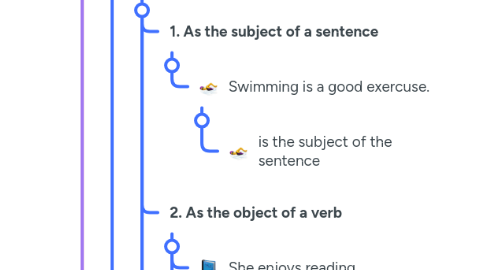
1. A gerund is the -ing form of a verb that functions as a noun. Gerunds can be the subject, object, or complement of a sentence.
1.1. Uses of Gerunds
1.1.1. **1. As the subject of a sentence**
1.1.1.1. Swimming is a good exercuse.
1.1.1.1.1. is the subject of the sentence
1.1.2. **2. As the object of a verb**
1.1.2.1. She enjoys reading.
1.1.2.2. "Reading" is the object of the ver "enjoys."
1.1.3. **3.As the object fo a preposition**
1.1.3.1. They are interested in learing.
1.1.3.2. **learning** is the object of the preposition **in**
1.1.4. **4. As a subject complement**
1.1.4.1. His favorite activity is running.
1.1.4.2. **running** complements the subject **his favorite activity**
1.1.5. **After certain expressions**
1.1.5.1. It's no use **crying** over spilled milk.
1.1.5.2. **crying** is used after the expression **It's no use**
1.2. **Verbs commonly followed by Gerunds**
1.2.1. Enjoy: She enjoys cooking.
1.2.2. Avoid: He avoids driving at night.
1.2.3. Consider: They considered moving to another city.
1.2.4. Suggest: She suggested going to the museum.
2. A To-Infinitive is the base form of a verb preceded by **to**. It can function as a noun, adjective, or adverb.
3. Uses of To-Infinitive
3.1. **1. As the subject of a sentence**
3.1.1. **To read ** is enjoyable.
3.1.2. **To read** is the subject of the sentence.
3.2. **2. As the object of a verb**
3.2.1. She want **to trave.**
3.2.2. **to travel** is the object of the verb **wants**
3.3. **3. To show purpose**
3.3.1. She went to the store **to buy** some groceries.
3.3.2. **To buy** indicates the purpose of going to the store.
3.4. **4. As a subject complement**
3.4.1. His goal is **to become ** a doctor.
3.4.2. **To become** complements the subject **his goal.**
3.5. **5. After certain adjectives**
3.5.1. She is happy **to help.**
3.5.2. **to help** follows the adjective **happy**
3.6. Verbs commonely followed by To-infinitive
3.6.1. Decide
3.6.2. Hope
3.6.3. plan
3.6.4. Refuse
4. Differences and Overlasps
4.1. **1. Meaning changes**
4.1.1. Some verbs can be followed by either a gerund or a to-infinitive, but the meaning changes.
4.1.1.1. Stop: I stopped smoking. (I quit smoking.) I stopped to smoke. (I paused what I was doing in order to smoke.)
4.2. **2. Little to No Difference:**
4.2.1. Some verbs can take either a gerund or a to-infinitive with little to no change in meaning.
4.2.1.1. Start: She started reading. She started to read.
4.3. **3. Fixed Structures:**
4.3.1. Some verbs are typically followed by only one form.
4.3.1.1. Avoid: He avoids eating junk food. (Not "to eat") Promise: She promised to help. (Not "helping")
